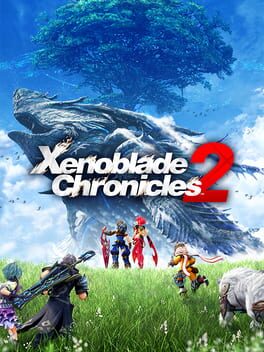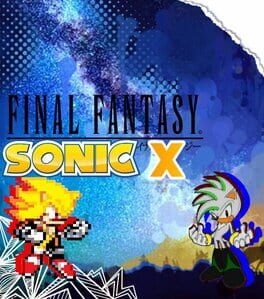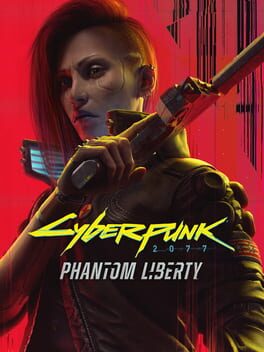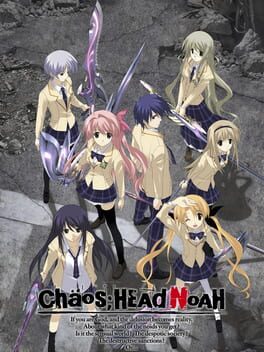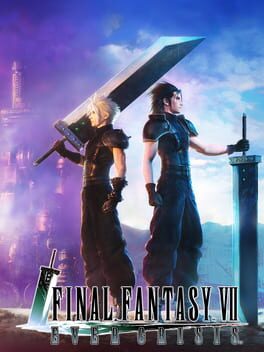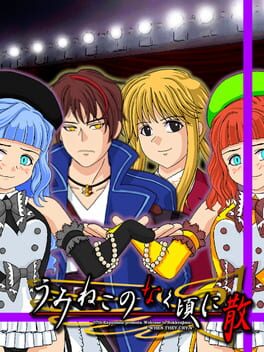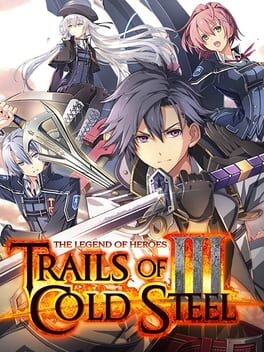ThriceUponATime
551 Reviews liked by ThriceUponATime
Within the game's gorgeous open zones, windows of interaction with different manners of moving through the maps (using a stream of wind to get up a platform, using a fire skill to burn down vines, etc.) are often gatekept by a varied set of abilities acquired by leveling up certain attributes in favour of specific openings in the game's Affinity trees (which are unique for each Blade) --- the so called field skills are only but one of the many variables that rule how Blades you bond with will interact with traversal, combat and overall progression through the game. There is a notable contrast between the sprawling, natural and detailed zones of the setting and the slippery, awkward character movimentation through these same panoramas filled with markers and cluttering UI identifiers; an incongruity between the maximalist, megalomaniac numerical obsession of the matters in which players connect and interact with that virtual world, and the often terrain-based combat/navigation that constantly demands that you look around and look for gaps between the pixelated topography, to check if there's an unrelated enemy around who could aggro you and interrupt your chain of orbs, to topple a flying enemy and make it fall down after you make it to higher ground, to use rails, rocks or other common environment assets to cheese your way through battles by gaining distance from the enemy's aggroing and auto-attacking with a bitball or a cannon while their path is blocked by said asset, to make use of the game's many position-based Arts: these strategies are not exceptions, but constant thoughts and visualizations I had through the game's many, many encounters.
This friction between the 'artificial' and the 'pulsing', the 'constant' and the 'drifting', is what builds this game's main dialectics: in this made-up world of flamboyant designs destined to be made fun of or utilized for their visual and questionable appeal, of series of integers and technical rigidness bounding the player to a progression based on variables and array-based requirements, how do we achieve genuine connection between constructs that seem to attract inherent unseriousness and confusion? How do we break down the walls of 'artifices' between the player and the game? The answer could only be one: Rex, and his Salvager Code.
The panache and naivete of juvenile optimism, the shonen-esque confidence in all that exists and the resolve to make people smile. Within the bounds of its own artificiality and the signifiers used to construct its experience, Xenoblade Chronicles 2 somehow manages to weave a convincing force of sincerity through a world that is conducted by the forces of constants, arrays, dipping frames and uncertain dynamic resolution --- all of that which cannot be organically touched or interacted with, ends up crossing the walls of mechanicality unexplainably by the end of it all, finding expression and meaning in the most unexpected places. A boy and a girl make a promise to reach Paradise; the boy complies without knowing why, not even because of the fact she saved his life right beforehand --- for giving his life for a stranger is simply his spirit. A girl who fears her own power, shutting herself off for unspecified milennia; a boy who finds treasures in junk for a living, salvaging meaning and memories out of seamless clouds. In the friendship between Rex and Pneuma lies the game's final and most important dichotomy, the impossibility between eternity and remembrance, the way in which our selves are tied to our egos which are formed by the promises we make to each other, how one would rather die than be forgotten by the one they love and keep on going for infinity. Theirs is a relationship of light: uncertainness about oneself's purpose breed spontaneity and trust in that which shines the way forward. Shin had Metsu, Hana had Hikari; within the endless streams of lights we project when we break down the walls of artifices between us, we find identity and purpose.
In each of the game's varied landscapes, one sight tends to repeat itself: the view of Alrest's enormous World Tree, the promised spot that gives access to Paradise and God, peering at his creations above the sea of white. To find that these organic leaves sprouting from its head and that the wooden exterior of its large shell house a high-tech facility full of elevators and robot guards only intensifies the images that Alrest creates through gameplay: an ocean hiding before humanity's ruins in Morytha, the vistas of the clouds forming different shapes and patterns within the perspectives of each character, numerical catharsis and exploitation of the artifices as a means of visualizing the act of bonding and the struggle of moving forward by your own means. Connecting Arts and auto-attacks indefinitely, building up elemental spheres and breaking them with the collective power of strategized synchrony; the endless QTEs building up in the screen demanding timing and linking in this fascinating real-time turn-based system.
"I love this world because you're in it."
This friction between the 'artificial' and the 'pulsing', the 'constant' and the 'drifting', is what builds this game's main dialectics: in this made-up world of flamboyant designs destined to be made fun of or utilized for their visual and questionable appeal, of series of integers and technical rigidness bounding the player to a progression based on variables and array-based requirements, how do we achieve genuine connection between constructs that seem to attract inherent unseriousness and confusion? How do we break down the walls of 'artifices' between the player and the game? The answer could only be one: Rex, and his Salvager Code.
The panache and naivete of juvenile optimism, the shonen-esque confidence in all that exists and the resolve to make people smile. Within the bounds of its own artificiality and the signifiers used to construct its experience, Xenoblade Chronicles 2 somehow manages to weave a convincing force of sincerity through a world that is conducted by the forces of constants, arrays, dipping frames and uncertain dynamic resolution --- all of that which cannot be organically touched or interacted with, ends up crossing the walls of mechanicality unexplainably by the end of it all, finding expression and meaning in the most unexpected places. A boy and a girl make a promise to reach Paradise; the boy complies without knowing why, not even because of the fact she saved his life right beforehand --- for giving his life for a stranger is simply his spirit. A girl who fears her own power, shutting herself off for unspecified milennia; a boy who finds treasures in junk for a living, salvaging meaning and memories out of seamless clouds. In the friendship between Rex and Pneuma lies the game's final and most important dichotomy, the impossibility between eternity and remembrance, the way in which our selves are tied to our egos which are formed by the promises we make to each other, how one would rather die than be forgotten by the one they love and keep on going for infinity. Theirs is a relationship of light: uncertainness about oneself's purpose breed spontaneity and trust in that which shines the way forward. Shin had Metsu, Hana had Hikari; within the endless streams of lights we project when we break down the walls of artifices between us, we find identity and purpose.
In each of the game's varied landscapes, one sight tends to repeat itself: the view of Alrest's enormous World Tree, the promised spot that gives access to Paradise and God, peering at his creations above the sea of white. To find that these organic leaves sprouting from its head and that the wooden exterior of its large shell house a high-tech facility full of elevators and robot guards only intensifies the images that Alrest creates through gameplay: an ocean hiding before humanity's ruins in Morytha, the vistas of the clouds forming different shapes and patterns within the perspectives of each character, numerical catharsis and exploitation of the artifices as a means of visualizing the act of bonding and the struggle of moving forward by your own means. Connecting Arts and auto-attacks indefinitely, building up elemental spheres and breaking them with the collective power of strategized synchrony; the endless QTEs building up in the screen demanding timing and linking in this fascinating real-time turn-based system.
"I love this world because you're in it."
This game has a really unique way of telling it's story and it has a very nice soundtrack. I've always preferred story driven games and based on what I've heard...this seemed like it would be right up my alley. However, I think playing this helped me realize that I don't quite enjoy games that are TOO story heavy.
During my playthrough my plan was to focus on the story until I couldn't progress further and then focus on the battles. For some reason though I just could not focus on the story mode for more than an hour at a time. Even when I was enjoying the story I would only do a few chapters and then feel like I had my fill for the day. (This is probably why it took me 3 months to finish lol.) I felt this way with the battles as well. I enjoyed the combat but after doing 2 or 3 waves back to back I just felt like I stopping and doing something else.
Overall, I liked the game enough to finish it but it wasn't really something that I was thoroughly hooked on.
During my playthrough my plan was to focus on the story until I couldn't progress further and then focus on the battles. For some reason though I just could not focus on the story mode for more than an hour at a time. Even when I was enjoying the story I would only do a few chapters and then feel like I had my fill for the day. (This is probably why it took me 3 months to finish lol.) I felt this way with the battles as well. I enjoyed the combat but after doing 2 or 3 waves back to back I just felt like I stopping and doing something else.
Overall, I liked the game enough to finish it but it wasn't really something that I was thoroughly hooked on.
Xenogears
1998
At this point everyone knows that Cyberpunk’s had an infamously disastrous launch. It’s taken CDPR nearly 3 years of updates (and probably a lot of help repairing the IP’s reputation with the anime) to even get it in the state it should’ve been in the first place. How it was released in 2020 wasn’t acceptable, but I decided to replay it fully with the new 2.0 update and DLC out and credit where it’s due, they did put a lot of work into correcting its faults. There’s still some jank here and there and Night City is still not quite the liveliest cityscape it was promised to be, but the complete revamp of its systems along with improvements on a technical level finally puts it in a state where I’d call it a pretty great game. Especially now that what Cyberpunk does well the most (its story, quests, and character detail/animations) can be more appreciated without the endless bugs and crashes every few moments
That goes for the base game but of course there’s also Cyberpunk’s new expansion Phantom Liberty. The Witcher 3 set an immense standard with Hearts of Stone and Blood and Wine, both of which are among the best DLC there is in my opinion. I’m still more a fan of TW3 in general so personally would rank those a bit higher, but PL continues their streak of high quality expansions and is a really strong addition to the game. Telling a different but no less engrossing spy story that directly ties with V’s struggle to survive in the main game, with expectedly great performances throughout (including Idris Elba) and more difficult choices than before with two different ending paths
The new area Dogtown slots seamlessly into Night City’s Pacifica district. It’s not as sprawling compared to say TW3’s Toussaint, but it’s dense and very detailed with most of the content there being a step up from the main game. Along with the story quests there are 9 new side gigs that are more fleshed out than the usual filler ones, and with the new gear and 2.0 abilities in combat it’s much more fun to actually play. And the music is still great, especially that ending song by Dawid Podsiadło. Fantastic stuff and was perfect with the credits sequence
So overall with the improvements since launch and DLC, Cyberpunk’s been rough to start but in a good place now. l’m actually looking forward to what they’ll do next with Orion some day, though with CDPR’s switch from REDengine to UE5 here’s hoping they won’t have more development issues with that one
That goes for the base game but of course there’s also Cyberpunk’s new expansion Phantom Liberty. The Witcher 3 set an immense standard with Hearts of Stone and Blood and Wine, both of which are among the best DLC there is in my opinion. I’m still more a fan of TW3 in general so personally would rank those a bit higher, but PL continues their streak of high quality expansions and is a really strong addition to the game. Telling a different but no less engrossing spy story that directly ties with V’s struggle to survive in the main game, with expectedly great performances throughout (including Idris Elba) and more difficult choices than before with two different ending paths
The new area Dogtown slots seamlessly into Night City’s Pacifica district. It’s not as sprawling compared to say TW3’s Toussaint, but it’s dense and very detailed with most of the content there being a step up from the main game. Along with the story quests there are 9 new side gigs that are more fleshed out than the usual filler ones, and with the new gear and 2.0 abilities in combat it’s much more fun to actually play. And the music is still great, especially that ending song by Dawid Podsiadło. Fantastic stuff and was perfect with the credits sequence
So overall with the improvements since launch and DLC, Cyberpunk’s been rough to start but in a good place now. l’m actually looking forward to what they’ll do next with Orion some day, though with CDPR’s switch from REDengine to UE5 here’s hoping they won’t have more development issues with that one
Xenogears
1998
The most compelling and psychological story ever told, period. Fei Fong Wong is one of the most compelling and introspective characters I've seen in a JRPG; the same sentiment can go towards Elly and Krelian's character. But I do find some of the other cast of characters to not be executed well enough, (for instance: Rico). And everyone knows about the infamous Disc 2 where it turns the entire typical JRPG gameplay the first disc had and made it into basically a visual novel. Also, sadly, this game suffered from a lot of grinding in order to progress with the story. It was an ambitious game that was rushed and had a team where they weren't experienced with 3D modeling so it was a recipe for disaster yet it turned out to be a near masterpiece. I didn't mind the sudden change in disc 2 because I found the lore and the worldbuilding to be so fascinating that I just wanted to learn more.
After playing this game, I have read so many books and read so many articles discussing gnosticism, and the many branches of psychological thinking (Carl Jung, Sigmund Freud, Jacques Lacan, etc). This game made me think about my life in a very unique way and opened my eyes to what storytelling can accomplish. Because of this, I was on a hunt to find games similar to Xenogears but had very little success in doing so over the years. That is why this game is so special; there is quite literally nothing like it. I thank this game for getting me into psychoanalytics and am grateful I got to experience this game in my life.
Controversial take, but this is a game that I feel deserves a remake the most; if Square ever does touch up on Xenogears and fixes its problem, this could very well end up being the greatest game ever made. I know the gaming industry is going through a sort of "remake renaissance," but, with the right team and vision, I can see a remake of Xenogears being done well. The base game is not perfect and has many flaws but most masterpieces exhibit the same sentiment. Despite it all, I find Xenogears to be one of the greatest games ever made and no other game is at the same level of complexity quite like Xenogears.
After playing this game, I have read so many books and read so many articles discussing gnosticism, and the many branches of psychological thinking (Carl Jung, Sigmund Freud, Jacques Lacan, etc). This game made me think about my life in a very unique way and opened my eyes to what storytelling can accomplish. Because of this, I was on a hunt to find games similar to Xenogears but had very little success in doing so over the years. That is why this game is so special; there is quite literally nothing like it. I thank this game for getting me into psychoanalytics and am grateful I got to experience this game in my life.
Controversial take, but this is a game that I feel deserves a remake the most; if Square ever does touch up on Xenogears and fixes its problem, this could very well end up being the greatest game ever made. I know the gaming industry is going through a sort of "remake renaissance," but, with the right team and vision, I can see a remake of Xenogears being done well. The base game is not perfect and has many flaws but most masterpieces exhibit the same sentiment. Despite it all, I find Xenogears to be one of the greatest games ever made and no other game is at the same level of complexity quite like Xenogears.
Xenogears
1998
Lies of P
2023
Chaos;Head Noah
2009
A game that drags for 3 chapters only to dump everything in the last 2 chapters, this game has severe pacing issues and strange priorities.
I kinda don't like the retcons too much, it borrows too much from previous entries (like Sky and Crossbell) for a severe lack of identity that kind of hurts many events in the past.
Setting that aside, I did enjoy my time spent for the most part.
Played on nightmare (Game was very easy, too much broken stuff lol) and aimed for the most completion (83% achievements on Gog)
I kinda don't like the retcons too much, it borrows too much from previous entries (like Sky and Crossbell) for a severe lack of identity that kind of hurts many events in the past.
Setting that aside, I did enjoy my time spent for the most part.
Played on nightmare (Game was very easy, too much broken stuff lol) and aimed for the most completion (83% achievements on Gog)
